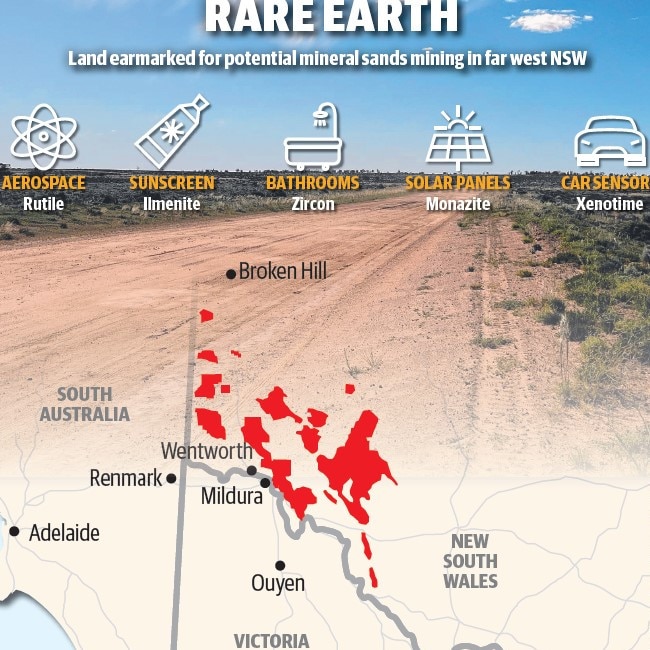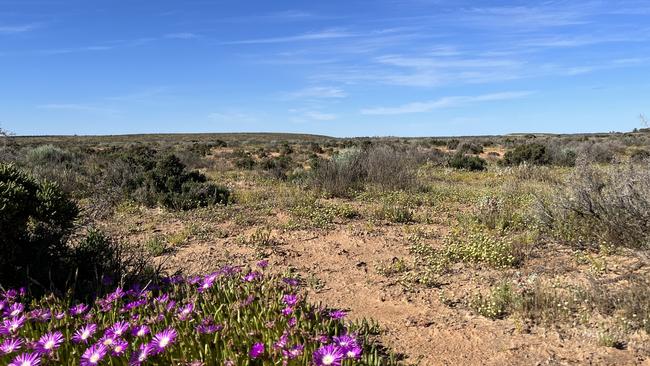The resources boom changing the face of far west NSW
A new generation of mining companies has its sights on far west NSW, and pastoralists say the impending mining boom could change their way of life forever.
A new generation of mining companies has its sights on far west NSW, and pastoralists say the impending mining boom could change their way of life forever.
In an area stretching from Broken Hill in far west NSW to Balranald on the Victorian border, mining companies are on the hunt for mineral sands – a valuable trove of trace minerals used in batteries, solar panels and electronics.
Companies RZ Resources, Iluka and Cobalt Blue say they have found orebodies containing titanium, zircon, rutile and other rare earth elements in the region and are working to obtain mining approvals.
They are just a few of the miners hunting for rare earths across the state after Mining, Exploration and Geoscience, part of the Department of Regional NSW, issued more than 220 exploration licences in 2021 — the highest number since 2008.
The boom is being driven by the NSW Government, which hopes to position NSW as a major global supplier of rare earths. In September, deputy Premier Paul Toole labelled critical minerals “the future of mining in NSW” and opened up a funding pool of $2 million to $10 million.
But pastoralists say the exploration boom is affecting their ability to farm their land.
Farmer Penne Clarke, who runs Merino sheep and rangeland goats across 48,000ha near White Cliffs, became a de facto point of contact for farmers whose properties were subject to exploration licences after she and her husband Tas challenged an explorers right to access their land in 2008.
She said the number of exploration licences being handed out now was unprecedented, and there was too little support for farmers.
“Under the state laws, everything below the surface (of the land) belongs to the Crown. The Crown gives out licences to explore and then the licensee (the mining company) must come to the land holder to organise access. We don’t have the ability to stop them,” she said.

Exploration underway in far west NSW affects dozens of properties. The Weekly Times has spoken to some of the affected landholders but has not named them due to ongoing legal negotiations.
Ms Clarke, who is also a representative on the western division of NSW Farmers, said exploration was necessary, but miners needed to pay a fair price for up-ending a farmer’s livelihood.
In 2021, when a Broken Hill sheep grazier faced mining company Cobalt Blue in the Land and Environment Court over access to 7000ha of land for exploration, the court heard exploration work was taking place seven days a week and involved two to three diamond drill rigs, two to three crawler units, four to six service trucks, 12 – 20 light vehicles, a bulldozer, bobcat and storage facilities.
Up to 46 personnel were on site for resource and definition drilling, 44 people for geotechnical and ancillary drilling, and 86 people for bulk sampling over 8-10 months.
The court ordered the company to pay $60,000 annually for access to three exploration licences — higher than the $9000 offered by the company.
Ms Clarke said the cost of taking such a case through court outweighed possible benefits. Her court case in 2008 cost her “a six figure sum and two years of my life”.
Ultimately the explorer on her land, who she argued didn’t have the money to undertake required rehabilitation work, was allowed access but backed out. She now has more exploration work underway on the property.
Ms Clarke urged landholders not to sign access agreements until they had done due dilligence. Mining exploration on farms posed risks to work health and safety and biosecurity, she said.
“By law, a farmer needs a (biosecurity) plan. You need to protect your country and other people from pest species. But if somebody was licensed under the Mining Act to go onto your land and refuses to follow (your biosecurity plan), then there’s nothing you can do.

Cobalt Blue wasn’t the only mining company in the region to have faced scrutiny.
After a complaint from a landholder in 2021, the NSW Resources Regulator found mining company RZ Resources, which was exploring for mineral sands across 10 sites south of Broken Hill, had created unapproved access tracks, drilled to excessive depths, used an unapproved drill rig, failed to fill in drill holes, provided false or misleading information and had no community consultation strategy.
The regulator found it had grounds to cancel the company’s ten exploration licences but opted not to because it determined it was not a “proportionate regulatory response”.
Ms Clarke said farmers needed more protection.
“The regulator continues to lose the social licence that society gives them when they fail to properly regulate.
“Landholders shouldn’t be disadvantaged in any way when companies come looking for these resources,” she said.





